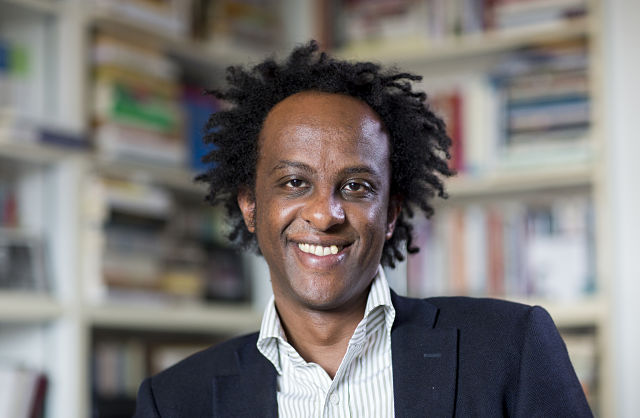 In the following essay published this month by Guernica magazine, Ethiopian American novelist and writer Dinaw Mengestu reflects on returning to Ethiopia. (Photograph: The MacArthur Foundation/Getty Images)
In the following essay published this month by Guernica magazine, Ethiopian American novelist and writer Dinaw Mengestu reflects on returning to Ethiopia. (Photograph: The MacArthur Foundation/Getty Images)
By Dinaw Mengestu
Growing up, we had strange bedtime rituals. In Peoria, Illinois, when my sister and I were very young, my father would sit between our beds and tell us stories of animals who fought, lied, and cheated their way through the jungle world he invented for us. There were dense forests, green hills, and rivers. There were lions, crocodiles, zebras, giraffes, and laughing hyenas, which my father, in his raspy scarred voice, would imitate. The heroes of the stories were always two mischievous monkeys who could cheat all the other animals who, while taller, stronger, and more ferocious than them, lacked their wit. In the end the monkeys always found refuge at the top of the tallest trees—a vantage point from which, in retrospect, they would have had a clear view of all the havoc they had caused.
As a child, I didn’t think of the stories as being particularly related to Ethiopia, or, on a broader scale, Africa. I didn’t think about where this landscape, with trees that, according to my father, were larger than anything I could imagine, came from, or what these animals, whom my father spoke of as if real intimates, were doing in the crowded and deeply divided bedroom my sister and I shared. They were ordinary fictions, bedtime tales invented wholesale each night, sprung effortlessly from my father’s mind like a long, deep breath. And so there he is, in both memory and imagination, straddling the narrow space between our beds with these stories that my sister and I were both desperate to hear, clueless as to how far they had traveled to wash up, as if by accident, in Middle America.
My father, of course, eventually stopped with the stories. He might have done so because we no longer asked him to tell us them, or because we were old enough to read on our own, or because it was the mid-1980s, and Caterpillar, where my father worked, was going through a round of layoffs that would bankrupt my parents’ plans of buying their first home. Or perhaps he stopped because suddenly, everywhere we turned, Ethiopia, or one tragic version of it, was staring back at us. There it was on the evening news, dying of hunger, and there it was in the well-intentioned questions of strangers who must have been baffled to hear my father declare that he was a political exile, one who had fled a civil war, the same one that was helping cause the famine. I became conscious around then of my father’s politics and that growing consciousness meant eschewing childish things. I saw how he read and watched the news with an almost religious devotion. I remember him voting for Reagan as a newly minted US citizen, because Reagan, like my father, hated the communists, both in Russia and the ones who had taken over Ethiopia. I remember staying up past my bedtime to watch the news of the US bombing of Libya. It was a strangely celebratory mood in our apartment—my father applauding the president as he spoke from the Oval Office, and then, later, calling the White House to share his overwhelming, wholehearted support. The Libyans weren’t communists, but Gaddafi was a tyrant, just like Ethiopia’s Mengistu Haile Mariam. On the scale of things, Tripoli wasn’t that far from Addis Ababa, and now, after that evening, who knew where in Africa America’s bombs might land next.
Read more at Guernicamag.com »
—
Join the conversation on Twitter and Facebook.

























